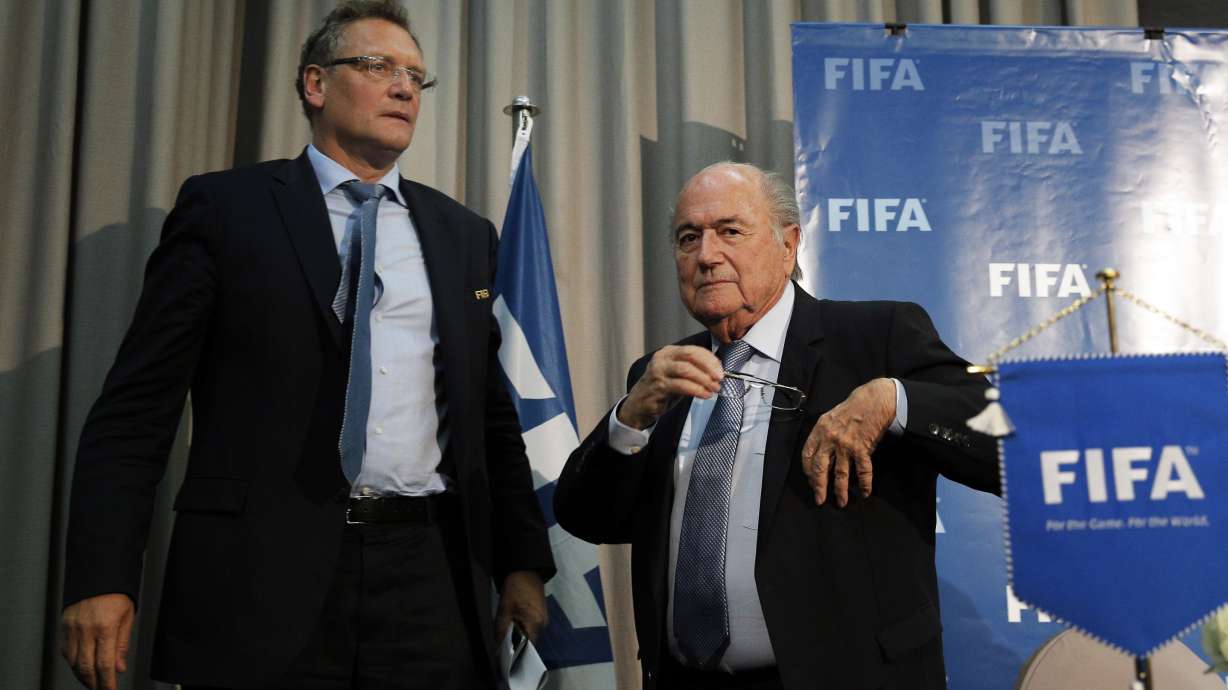Estimated read time: 3-4 minutes
This archived news story is available only for your personal, non-commercial use. Information in the story may be outdated or superseded by additional information. Reading or replaying the story in its archived form does not constitute a republication of the story.
MARRAKECH, Morocco (AP) — Ever since FIFA executives voted to send the World Cups of 2018 and 2022 to Russia and Qatar there have been endless questions about how and why they picked those countries and accusations that some of them might have been bought off or otherwise leaned on.
With FIFA's already tarnished reputation taking a beating, it reached out to lawyer Michael Garcia, a respected former U.S. Attorney, to investigate.
But when Garcia was finished, FIFA sat on his findings, saying his 430-page report couldn't be published and instead putting out only a summary.
That cleared Russia and Qatar of major wrongdoing. It also upset Garcia and did nothing to allay suspicions that FIFA must have something to hide. Garcia resigned in protest this week, delivering a parting blow at FIFA's "lack of leadership."
That, in turn, upped pressure on FIFA to reverse course. It did so Friday at a meeting of its governing executive committee after what one participant, Domenico Scala, described as an "animated discussion." The 25 voting members agreed the report, redacted with names taken out, can be published ... in good time.
Here's a look at the key points of that decision, which FIFA President Sepp Blatter said was unanimous.
___
WHY THE U-TURN? FIFA executives seem to have decided that whatever is in Garcia's report can't be as bad as the hammering they were getting for not releasing it.
Since his re-election in 2011 — unopposed after bribery allegations took out his challenger — Blatter has championed a reform process to make the organization he has led for 16 years more credible. That effort, however, was being shredded by the secrecy surrounding what Blatter now calls "this famous Garcia report" and the legalese FIFA employed to try to justify why it couldn't be published.
"This World Cup awarding in 2010 has had so much drama and had such an impact on people that they now want to know what exactly happened," executive committee member Theo Zwanziger said Friday. "The fallout from not publishing is worse than transparency."
___
WHAT HAPPENS NEXT? More waiting. Before he resigned, Garcia launched prosecutions against five people, three of them still serving on the executive committee, for alleged wrongdoing in the World Cup campaigns. That includes suspicions some of them might have taken or asked for gifts and favors from bidding nations.
FIFA says those investigations must be concluded before Garcia's report can be published. That could take a long while, years even, because anyone found guilty could exhaust multiple appeals.
Blatter said FIFA is trying to speed the process, telling its ethics committee handling the probes "to take more lawyers or whatever they need."
___
WHAT'S IN THE REPORT? That's still the big question. Only a few people have read it. One of those is FIFA ethics judge Joachim Eckert. He said he didn't see any smoking gun that would justify stripping Qatar and Russia of their World Cups. Irregularities in the bidding process were "only of very limited scope" and "far from reaching any threshold that would require returning to the bidding process," he said in his 42-page summary.
And that might have been the end of this saga — at least that is what some at FIFA hoped — if Garcia hadn't subsequently objected. He said Eckert misrepresented his findings. That, in turn, reopened the question: What exactly did Garcia find out and was it so damaging that FIFA would rather sweep dirt under the carpet?
FIFA now has decided it better to let the public judge. Garcia's report will be published with names redacted, "in an appropriate form," FIFA said.
___
WHAT OF RUSSIA AND QATAR? Unless some major new evidence of wrongdoing turns up somewhere, they seem certain to keep their World Cups. The votes FIFA executives cast in Zurich won't be re-opened, and preparations continue.
"There is no reason to say that our decisions were wrong. So we will go on sticking to our decisions," Blatter said. "There must be huge upheaval, new elements must come to the fore, in order to change this."
Copyright © The Associated Press. All rights reserved. This material may not be published, broadcast, rewritten or redistributed.








